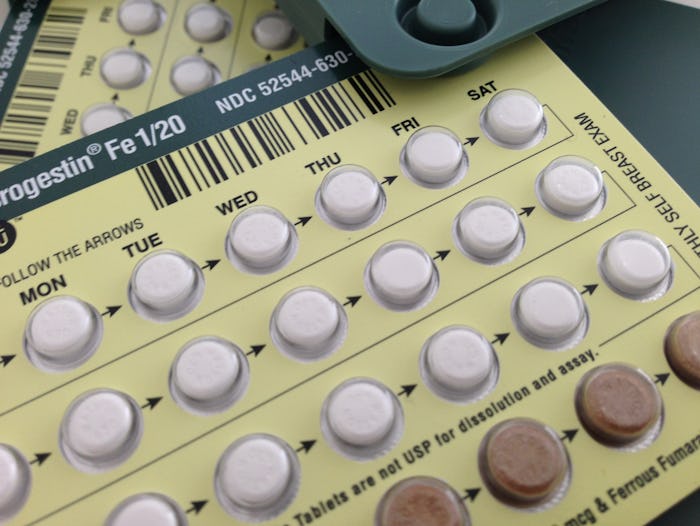Life

7 Birth Control Myths You Shouldn't Believe, Because You Can Get Pregnant While Breastfeeding
Deciding to use birth control can be an overwhelming decision. There are so many options to choose from, made even harder by the fact that misinformation about sexual health runs rampant in the United States. Thanks to a combination of abstinence-only education and the general shame and stigma around sex and bodies, myths about birth control are persistent.
A recent study by The American College of Midwives found that, out of 1200 cisgender women surveyed, only 55 percent felt knowledgeable about condoms and 49 percent felt knowledgeable about birth control pills. This is a huge knowledge gap, and indicates that people who may want to prevent pregnancy don’t actually know how. Giving people the power to make informed decisions about their bodies and health care is a huge step towards fighting oppression.
Misconceptions about birth control can run from the benign to the downright dangerous, so mythbusting is crucial to changing the way people think about (and use) contraceptives. When you’re equipped with accurate information, you can make fully-informed decisions about your health care, your body, and (most excitingly) your sex life. When you don’t have to wonder whether your method of birth control is effective, you’re free to enjoy fun, worry-free sex whenever (and wherever) you want. When you look at it that way, talking about birth control suddenly seems really hot, doesn’t it?
On that note, here are some common myths about birth control that you shouldn’t believe, and the facts to bring with you the next time a friend repeats one of these disproven claims.
1 Birth Control Pills Make You Gain Weight
This is a persistent myth, and is a common concern cited by people considering the pill as an option. Researchers at the Cochran Database System Review looked at 49 studies that compared a variety of birth control methods with placebos. They found no evidence that birth control causes weight gain. That being said, everyone’s body reacts differently to different kinds of birth control. If you’re taking a pill that you think may be causing you to gain weight, don’t be afraid to ask your doctor about other pills. There are a lot to choose from!
2The Pullout Method Is As Effective As Using Contraceptives
According to Planned Parenthood, using the the pullout method correctly every single time you have sex is 96 percent effective in preventing pregnancy. (When used incorrectly even once, that figure falls to 73 percent. Oof). Compare that with most forms of contraceptives, which have efficacy rates that range from 98 percent (condoms) to 99.9 percent (birth control pills and IUDs), and you see the numbers aren’t an exact match. It’s definitely a good idea to look into a form of contraceptives as birth control instead of relying on withdrawal to prevent pregnancy.
3 3. The Morning After Pill Is Basically The Same Thing As Abortion
This is patently false. Emergency contraception works by preventing ovulation so that there’s no egg for sperm to fertilize. Abortion terminates an already existing pregnancy.
4Birth Control Doesn’t Really Work
When used correctly, most birth control options are over 99 percent effective, according to Planned Parenthood. And while no method of contraception is 100 percent effective, using two forms of birth control at once — like the Depo Provera shot and a condom —can reduce your chances of unwanted pregnancy even further.
5You Can’t Get Pregnant If You’re Breastfeeding
This is a biggie! I know several people who end up with unplanned pregnancies because they thought breastfeeding was an effective enough form of birth control. Also known as the Lactational Amenorrhea Method (LAM), it’s actually 98 to 99 percent effective in preventing pregnancy in the first six months following the birth of a baby. But this comes with big caveats, and is only accurate if a person is exclusively breastfeeding. Meaning if you’ve supplemented with formula at all, that changes everything. However, it’s possible to become pregnant even if you haven’t had a postpartum period, so relying on breastfeeding as birth control is taking a pretty big risk.
6Some Penises Are Too Big For Condoms
I used to work at an adult toy store and, for fun, we opened the condoms and rolled them over really large objects. Huge dildos, 2 liter soda bottles, our fists; you name it, we rolled a condom onto it. If I can comfortably roll a condom over my closed fist and down my forearm, I’m pretty sure a condom can fit comfortably on a penis.
7 You Can’t Have An IUD If You Have Never Had Children
This myth is actually based in fact – a super old fact that is no longer true. I had an IUD before having my first child and absolutely loved it. Depending on which IUD you get, it can be effective in preventing pregnancy for anywhere from three to ten years. Plus, you can change your mind at any time and have it taken out.
Images: Courtesy of lookcatalog, thestarshine, jeepersmedia, esparta, DavidD/Flickr; Giphy (3)